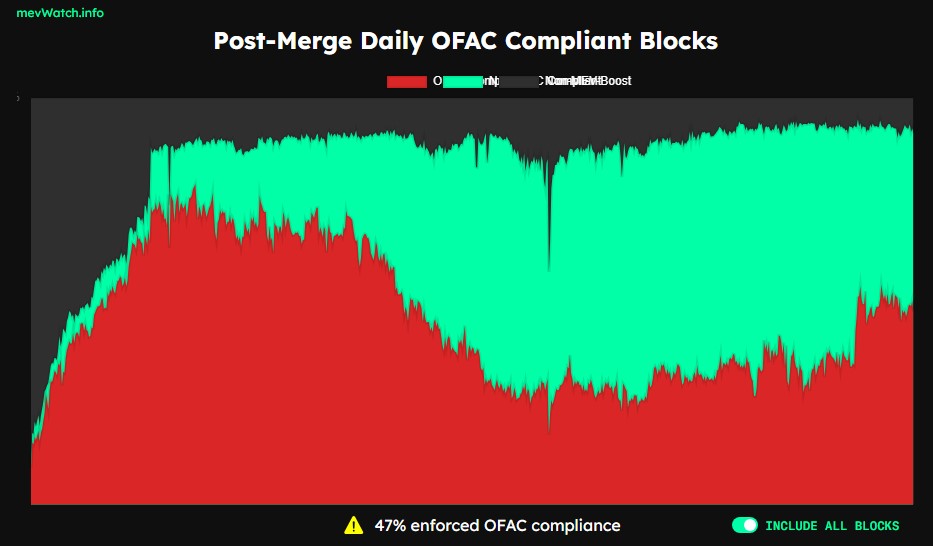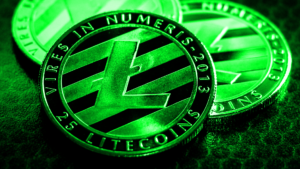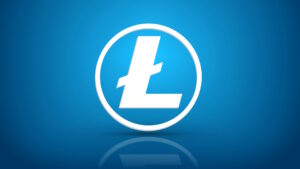Minting of OFAC compliant Ethereum blocks has trebled since its low on April 13, marking a concerning trend for protocol-level censorship amidst feelings of widespread injustice.
Due to financial censorship concerns, the Ethereum community has been keeping track of the cryptocurrency’s compliance with standards laid down by the Office of Foreign Assets Control (OFAC).
In the last five months, the network increased its OFAC-compliant blocks from 17% to 54%.
In October 2022, over half of Ethereum’s blocks were found to be compliant with these standards. On November 3, data from mevWatch confirmed that minting of such censorial blocks rose to 74%. The figure fell below the 50% mark in mid-February 2023, but has since returned to the mid-point, thereby raising concerns about the general trajectory of the Ethereum network.
The issue is troublesome for Ethereum as some MEV-Boost relays that are regulated under OFAC censor transactions. Consequently, the Ethereum network looses its neutrality.
Should the Ethereum community wish to remain neutral and maintain censorship-resistance – a crucial tenet for public cryptocurrencies – then OFAC-compliant blocks are a significant hindrance.
Compliance with OFAC allows the United States government to enforce economic and trade sanctions. The agency blacklisted privacy-preserving Tornado Cash addresses in August 2022 as a matter of ‘national security’.

According to the latest data from mevWatch, OFAC-compliant blocks are meandering at around the fifty-percentile level.
The uptick beyond the mid-point is noteworthy given that censorship resistance is a main pillar for decentralised public blockchains worth their salt. Similar to the non-negotiable hard-coded supply limit on Bitcoin and Litecoin, fundamental changes that are counter to core principles of public money could irrevocably compromise a public blockchain, rendering its use-case null and void.
In September 2022, the Ethereum ‘merge‘ cemented the network’s transition from proof-of-work to proof-of-stake, which some believe is a harbinger of corporate-centralisation of Ethereum nodes.
Vitalik puts censorship-resistance on the back burner
Censorship-resistance isn’t the only thing that’s taken a hit recently within the Ethereum community. MakerDAO’ Spark Protocol, a DeFi-lending platform for DAI stablecoin users, disallowed access to its website for users with a VPN in August, reigniting concerns of an escalating war on privacy in certain segments of the crypto community.
Just this week, Eth co-founder Vitalik Buterin released a research paper titled “Blockchain Privacy and Regulatory Compliance: Towards a Practical Equilibrium”. Among other things, Vitalik justifies halting supposed “illicit funds” on the Ethereum blockchain, the pretext of which could be used as a means to block political groups, as well as vocal citizens that may be out of favour or hold minority views.
Following the Trudeau regime’s censorship of the Canadian trucker convoy in February 2022, the question of financial sanctions against citizens has come further and further into the limelight too. This issue was further pressed with the recent unbanking scandal that saw high profile political figure, Nigel Farage, lose his banking account with Coutts in July.
Since civil liberties are guaranteed to go extinct without unalterable protocol-level protections, and cryptocurrencies like Bitcoin and Litecoin are defined by their close proximity to censorship resistance, concerns about the contents of Vitalik’s paper are certainly warranted.
Just adding some notes to @VitalikButerin‘s Privacy Pools whitepaper so that we can begin extrapolating out the real ramifications of this proposed capitulation. pic.twitter.com/50hKJdlaFD
— Chris Blec (@ChrisBlec) September 7, 2023
Commenting on a video where Vitalik acknowledges that every layer-two solution and rollup has a backdoor, one user speculated that users might not be able to use Ethereum financial layers if they don’t take a booster shot every three months. The same comparison was made with the Lightning Network.
I’m not surprised… L2’s will require kyc & you won’t be able to use them until you get booster shots every 3 months… the LN will suffer a similar fate via large hubs which will inevitably form
— Sandile S Ngwenya (@Sandile_S_N) August 14, 2023
With looming US Presidential elections, discussions about privacy, financial repression and civil liberties have become popular, despite lacklustre or negative mainstream media coverage, with many candidates now speaking openly about Bitcoin in their rallies and podcast interviews.
Sweeping encroachments on civil liberties and a prevailing sentiment of injustice were epitomised recently with Oliver Anthony’s sensational “Rich Men North of Richmond” song, which broke records and was well-received well beyond US shores. While fact-checkers and online algorithms on Facebook, Instagram and social media platforms downplay this underlying sentiment, pent-up anger and frustration appear to have reached boiling point.
Meanwhile, Ethereum’s co-founder seems to be heading in the opposite direction, blinkers in tact.
Join the telegram channel for updates, charts, ideas and deals.
Did you like the article? Share it!


